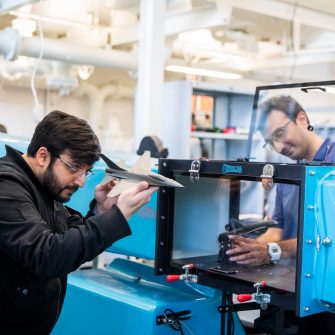Bachelor of Engineering (Honours) / Science (Computer Science)
- Commencing Terms
- Term 1, 2 & 3
- Duration
- 5 Year(s)
- Delivery Mode
- Face-to-face (includes blended)
- Campus
-
Kensington
- Codes
- UAC code 425850
- Program code 3785
-
2025 Indicative first year full fee
- $8,000*
-
2025 Indicative full fee to complete degree
- $46,000*
-
2025 Indicative first year full fee
- $58,500*
-
2025 Indicative full fee to complete degree
- $324,000*
- Overview
- Entry requirements
- What will I study?
- Future careers
- How to apply
- Fees & Scholarships
Overview
When you undertake this double degree you’ll graduate with two separate degrees that provide a diverse but complementary knowledge and skill-base.
The Bachelor of Engineering (Honours) component of this degree will give you a broad education in engineering so you can envision the different ways computer science can improve various engineering disciplines. Engineers develop practical solutions to technical and environmental problems by using science and mathematics. Through scientific discoveries engineers meet societal and consumer needs.
Through the Bachelor of Engineering you’ll gain a solid background in mathematics, natural sciences and computing that’ll prepare you to learn knowledge and skills in an engineering discipline. You’ll graduate with the technical knowledge, skills and attributes required to succeed as a professional engineer.
Computer Science is the study of the design, construction and use of computer systems. As a computer scientist you’ll use and create technology to solve problems and improve interactions between people and computers.
The Computer Science component emphasises comprehension of the basic principles behind computing tools, operating systems, compilers and translators, and computer hardware. You’ll study the representation of data and data structures and the design of algorithms, as well as the creation of hardware and software tools and the role of non-computing elements in the design and development process.
Why study this degree at UNSW?
UNSW Engineering is a leader in engineering education and research. We’ve invested in a $1 billion refurbishment of our engineering facilities. We're ranked #1 in Australia and #25 globally for Engineering and Technology, and ranked #4 in Australia for Computer Science. All eight of UNSW's Engineering schools are ranked in the global top 50 with two schools ranked in the global top 10 for Engineering subjects (QS World University Rankings by Subject, 2025).
Further rankings from QS World University Rankings by Subject, 2025:
- Ranked #1 in Australia for Civil and Structural Engineering
- Ranked #1 in Australia for Electrical Engineering
- Ranked #1 in Australia for Mechanical, Aeronautical and Manufacturing Engineering
- Ranked #1 in Australia and #2 globally for Mineral and Mining Engineering
- Ranked #2 in Australia for Chemical Engineering
- Ranked #2 in Australia and =#10 globally for Petroleum Engineering
The School of Computer Science Engineering is a leading centre for research and innovation in the field of computer science. We’re making meaningful contributions to businesses, government and community organisations through our breakthrough research. Partnering with CSIRO’s Data61 we’ve made critical breakthroughs in Cybersecurity using microkernels which have been successfully used in Apple iOS devices and real-world military systems including a space satellite platform for the US Navy.
When you study at UNSW’s School of Computer Science and Engineering you’ll benefit from:
UNSW’s School of Computer Science and Engineering research is ranked #1 in Australia for Algorithms, Artificial Intelligence, Databases, Embedded & Real-Time Systems and Operating Systems by CS Rankings
We have a five-star rating for employability, helping to guarantee your future on graduation
Learn from world-renowned researchers in their field
Our School is rated five stars by the Australian Research Council for the research field of Information and Computing Sciences
We leverage our strong industry ties to improve our research, teaching and students’ learning
Our industry partners include leading companies such as Atlassian, The Commonwealth Bank, Google, Honeywell, Microsoft and WiseTech Global
UNSW is known for its graduate employability, with UNSW awarded the Most Employable students for six years in a row (Australian Financial Review (AFR) Top100 Future Leaders Awards, 2020-2025).
UNSW Engineering is recognised as a global leader in research and innovation. We host and participate in several world class research centres and institutes. This includes ARC research hubs, cooperative research centres and other initiatives relating to renewable energy, water research and environmental technologies.
Take part in ChallEng when you study at UNSW Engineering. The award-winning ChallENG Program connects UNSW Engineering students, academics and companies to real-world, project-based learning initiatives. With exposure to a multidisciplinary learning approach, you’ll earn academic credit and develop your technical and design skills.
At UNSW Engineering you’ll benefit from a diverse and welcoming community. No matter what your particular interest, engineering or beyond, there’s a club or society for you. UNSW Engineering boasts 16 student societies including a society for each school. Get involved in Queer Students in Stem, Electrical Engineering Society, Women in Renewable Energy Society or Robogals. UNSW’s Women in Engineering (WIE) society runs social and industry events as well as programs designed to mentor and develop female engineers.
Want to see more from UNSW Engineering?
Entry requirements
Assumed knowledge
For Computer Science component: Mathematics Extension 1For Engineering component: Refer to the relevant Engineering degree entry
Adjustment Factors
We offer a range of adjustment factor schemes that reward students for academic performance and extra-curricular achievements. These schemes also take into account a range of personal and educational disadvantages that may have affected your studies.
HSC Plus
This scheme rewards students who perform well in Year 12 subjects that are relevant to their preferred UNSW degree. You may be awarded up to five points.
Elite Athletes, Performers and Leaders (EAPL)
This program recognises achievements in the areas of sport, academia, leadership and music at an elite level. You may be eligible for up to five points.
Educational Access Scheme (EAS), opens in a new window
Factors such as illness, financial hardship, language difficulties or attending a particular school can mean you don't always get the best possible marks in Years 11 and 12. If one of these situations applies to you, submit an application for the Educational Access Scheme (EAS) via UAC. Eligible students can receive between 1 and 10 points towards their chosen UNSW degree.
Admission pathways
This degree is eligible for admission through our Portfolio Entry Early Conditional Offer Scheme. Complete a submission to demonstrate your passion and performance in relevant subjects. Successful applicants will receive an early conditional offer with an adjusted ATAR entry requirement.
English language requirements
You may be asked to provide evidence of your English proficiency to study at UNSW depending on your educational background and citizenship. English language skills are vitally important for coping with lectures, tutorials, assignments and examinations - this is why UNSW requires a minimum English language competency for enrolment.
If you’re completing an Australian Year 12 qualification (e.g. NSW HSC or equivalent), you do not need to provide anything extra to prove your proficiency. Your qualification will be used as evidence of your English proficiency.
If you do need to provide evidence of your English proficiency, this will be indicated in your application. You can prove this by providing evidence that you meet one or more of the following criteria:
- English language tests and university English courses
- Prior study in the medium of English
- Other qualifications
If you need to improve your English skills before you start your degree, UNSW College’s Academic English Programs are for you. The programs are suitable for various English levels and help you prepare for university studies and life in Australia.
For more details, visit the English Language Requirements page.
International direct entry
| Qualifications | Direct entry requirement |
|---|---|
|
International ATAR
|
85.0
|
| UNSW Foundation Studies GPA |
7.5
|
|
Great Britain General Certificate of Education (GCE A levels)
|
11.0
|
|
International Baccalaureate Diploma (IB)
|
32.0
|
|
Scholastic Aptitude Test (SAT) (after 2016)
|
1210.0
|
We do not accept secondary qualifications from this country. We may accept tertiary study results, please contact us for more information.
Please contact us for direct entry requirements.
Admission pathways
If you do not meet the requirements for direct entry into your chosen degree, you may be eligible for a pathway program with UNSW College. UNSW College provides alternative entry options using university-approved content so that you can start your UNSW journey with confidence.
English language requirements
You may be asked to provide evidence of your English proficiency to study at UNSW depending on whether you are from an English-speaking background or non-English speaking background. English language skills are vitally important for coping with lectures, tutorials, assignments and examinations - this is why UNSW requires a minimum English language competency for enrolment.
If English is not your first language, you’ll need to provide proof of your English proficiency before you can be given an offer to study at UNSW. You can do this by providing evidence that you meet one or more of the following criteria:
- English language tests and university English courses
- Prior study in the medium of English
- Other qualifications
If you need to improve your English skills before you start your degree, UNSW College’s Academic English Programs are for you. The programs are suitable for various English levels and help you prepare for university studies and life in Australia.
For more details, visit the English Language Requirements page.
Check the specific English language requirements for this program
Program structure
Throughout this five-year degree you will be able to specialise in two separate areas:
Choose one of the 16 majors available in the Bachelor of Engineering (Hons) program – these include traditional options like Civil, Mechanical and Electrical Engineering but also new and emerging options like Renewable Energy Engineering and Quantum Engineering.
Complement your Engineering degree, with a cutting-edge Computer Science major in areas like Artificial Intelligence, Security Engineering and much more.
You’ll graduate with two powerful and complementary degrees, which will expose you to a variety of career options and opportunities.
Full program structure
Degree structures can vary depending on the major you choose, number of courses you choose and timetabling, to give you an indication you can consider the below.
In the first two years of your degree, you might study:
Introductory courses for your Engineering degree including courses in Mathematics, Physics and Computing
A range of introductory, core courses for your Computer Science degree in the areas of Programming, Computer Systems, Software Engineering, Data Structures, Computer Networks, Ethics, Object Oriented Design and Algorithms and Programming Techniques
From your third year onwards you’ll be able to tailor your degree to your interests by studying courses from your selected specialisations within Engineering and Computer Science. Within your specialisation options you will be able to choose elective units which will help you gain the skills you need for your career after graduating.
This degree requires you to complete 60 days of Industrial Training, which gives you some on the job experience before graduating, enabling you to develop the essential technical and professional skills, so you thrive in your future career.
You’ll also be able to access UNSW Engineering’s ChallENG program which is a project-based learning initiative and allows you to work on multidisciplinary projects lead by academic researchers and industry partners.
Future careers
UNSW Engineering graduates are some of the most sought-after engineers in Australia and abroad thanks to the reputation of our teaching. When you combine two Engineering degrees to receive two qualifications, you increase your attractiveness to prospective employers and set yourself apart with a unique skill set. Double degree graduates can open the door to more opportunities.
Graduates in Computer Science at UNSW benefit from our leading reputation in research and teaching, with many graduates recruited by industry partners before their degree is complete.
As a graduate of a double degree, your career opportunities will depend on your area of specialisation. Visit the various engineering degree specialisations for examples of career opportunities.
Accreditation
Engineers Australia
How to apply
Applications for undergraduate study from domestic students (Australian citizens, Australian permanent residents, Australian permanent humanitarian visa holders and New Zealand citizens) are processed by the Universities Admissions Centre (UAC).
Visit the Apply section of the UAC website, opens in a new window and you can nominate up to five degrees in order of preference, with the first being your most desired degree and university.
On-time applications for admission usually close at the end of September each year for Term 1 admission. Late applications can be submitted, but a late fee will apply. For study starting in Term 1, the majority of offers are made in December and January. Visit the UAC website, opens in a new window for key dates for admission outside of Term 1.
Ready to start your application?
For most international students, applications are submitted via our Apply Online service. We encourage you to submit your completed application as early as possible to ensure it will be processed in time for your preferred term.
Some high-demand programs with limited places, may have an earlier application deadline or may have an earlier commencement date. For more information visit our international applicant information page.
*If you are an international student studying an Australian qualification, go to the Universities Admission Centre (UAC), opens in a new window for application and UAC key dates. Note: If you are under 18 years of age, you need to make special arrangements. Read more.
Ready to start your application?
Fees & Scholarships
Commonwealth Supported Place: Student Contribution Band 2
*The student contribution for a Commonwealth Supported Place is an indication only of the amount payable in Year 1 based on a standard full-time load of 48 credit points (1.0 EFTSL). The actual student contribution you will be liable for depends on your individual program of study and the calendar year in which you enrol. Actual fees are calculated upon enrolment. Student contribution amounts are subject to annual review by the university and may increase each year during your studies (subject to caps determined by the Australian Government), effective at the start of each calendar year.
The indicative fees listed here are based on an estimated average and are for tuition only - other fees and charges are not included.
*Fees are subject to annual review by the University and may increase annually, with the new fees effective from the start of each calendar year. The indicative fees listed here are based on an estimated average and are for tuition only, other fees and charges are not included. The amount you pay will vary depending on the calendar year to enrol, the courses you select and whether your study load is more or less than 1 Equivalent Full Time Student Load (8 courses per year).
Indicative fees are a guide for comparison only based on current conditions and available data. You should not rely on indicative fees. More information on fees can be found at the UNSW fees website.
Indicative fees to complete the program have been calculated based on a percentage increase for every year of the program. Fee increases are assessed annually and may exceed the indicative figures listed here.
Indicative fees to complete the program include tuition plus an estimate of study-related costs of approximately $1,000 per year. To find out more about other costs, visit UNSW International.
Scholarships
At UNSW, we award over $83 million in scholarships each year. We pride ourselves on rewarding excellence and making university accessible to students from all walks of life. Whether you’re a domestic or international student, our range of scholarships, prizes and awards can support your journey.
Featured scholarship
Women in Engineering Scholarships
UNSW provides a wide range of Women in Engineering scholarships to support high-achieving female students throughout their degree.
Apply here and search for ‘Engineering’ in the keywords.

QS World University Rankings, 2025

AFR Top100 Future Leaders Awards, 2020-2025

#1 Australian uni attended by start-up founders





